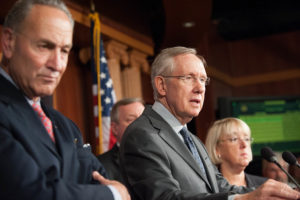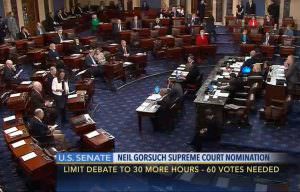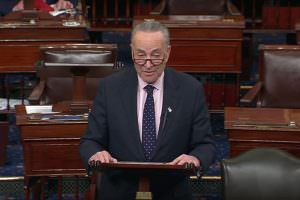Save the (Republican) Senators
Iraq has, for years since our supposed victory, been in a spiral of death and political despair that the American military cannot stop Despite the daily reports of carnage, Republican senators pushed to stay the course Now with re-election campaigns underway, suddenly even Republicans are seeing the light kind of.To understand the debate on Iraq now unfolding in the Senate, it is necessary first to give it a proper name: save the senators. The Republican senators, that is.
The rules are simple. Find a way — any way — to revise, reverse or otherwise wiggle out from under the series of embarrassing votes these same Senate Republicans took in February, March and April to block debate on what to do about the disaster in Iraq.
At the start of the legislative year, the Senate was not allowed to discuss changing course in Iraq because the Republican leadership lined up the votes necessary to stymie substantive progress. Not even the last refuge of the politically ridiculous — a nonbinding resolution declaring a “sense of Congress” on the need for a new military and diplomatic strategy — survived.
The filibuster has long been a friend to obstructionists, used commonly to thwart one party’s ideological ambitions or an objectionable nominee. This week adds a twist. Now it’s the chosen tactic to keep panicked Republicans from halting President Bush’s folly in Iraq.
For all their hand-wringing and rhetorical reversals, the handful of Republicans who’ve broken with the Bush White House do not now coalesce around a single proposal to accomplish what they say they want to achieve: the long-awaited policy shift to extricate our troops. So the numbers — 60 votes are needed to end a filibuster — still seem to favor the White House.
“The tide has turned,” said Sen. Olympia Snowe of Maine, who is openly considering voting with Democrats to begin a partial drawdown and redeployment of the remaining American forces in Iraq. “There’s not 60 votes, but I can assure you in September there will be.”
For a war in which deadlines come and go without consequence, where missions are “accomplished” only to become more bloody, where the justification for the current “surge” of military force was itself the failure of military action to quell sectarian violence, September is supposedly the drop-dead date. That is when Army Gen. David H. Petraeus, the top commander in Iraq, is likely to report what the news media already reports: Iraq is in a spiral of death and political despair that the American military cannot stop.
This truth has been evident for some time, but now re-election campaigns are underway and, suddenly, Republicans can see it clearly. So the Senate Republican caucus has come to resemble the factionalized Iraqi parliament, only without the competing militias. The appearance of Vice President Dick Cheney at the GOP senators’ private luncheon on Tuesday did not soothe the politically frantic. Cheney’s presentation prompted “a vigorous debate,” Sen. Susan Collins of Maine said afterward.
Still, only two Republican senators seem poised to vote to begin a withdrawal. Others echo the dark disinformation that usually emanates from the White House. We must stay the course, says Sen. Lindsey Graham of South Carolina, because “it would show al-Qaida that we’re serious about winning this global war.”
Another bloc seeks refuge behind the thinnest of political veils, some sort of legislation meant to force Bush to begin implementing the recommendations of the Iraq Study Group. Bush rejected the bipartisan group’s call for redeployment and diplomacy when it was issued last December. No Republican then stepped forward to seriously challenge that decision. None crafted a legislative proposal around the report.
“I don’t know why,” said Sen. Pete Domenici of New Mexico when asked why he didn’t push such legislation, which he now supports, when the study group spoke seven months ago. “Because none of us took it seriously then.” Domenici also told reporters he was “very busy” at the time.
In the months since the Iraq Study Group report was shelved in favor of Bush’s “surge,” nearly 600 American troops have died and about 3,500 more have been wounded. Bombings and beheadings of Iraqi civilians continue apace. Rocket and mortar attacks on the fortified “Green Zone,” which houses the U.S. Embassy and offices of other Western missions in Baghdad, have escalated.
Chaos and carnage do not pause because of some partisan need for political delay. This is one of the lessons we say we want competing Iraqi factions to learn. On Capitol Hill, it is advice freely given and predictably flouted.
Those looking for a political and perhaps even a substantive policy path out of Iraq need to stop this game of save the senators, and save the soldiers instead.
Marie Cocco’s e-mail address is mariecocco(at symbol)washpost.com.
(c) 2007, Washington Post Writers Group
Your support matters…Independent journalism is under threat and overshadowed by heavily funded mainstream media.
You can help level the playing field. Become a member.
Your tax-deductible contribution keeps us digging beneath the headlines to give you thought-provoking, investigative reporting and analysis that unearths what's really happening- without compromise.
Give today to support our courageous, independent journalists.




You need to be a supporter to comment.
There are currently no responses to this article.
Be the first to respond.